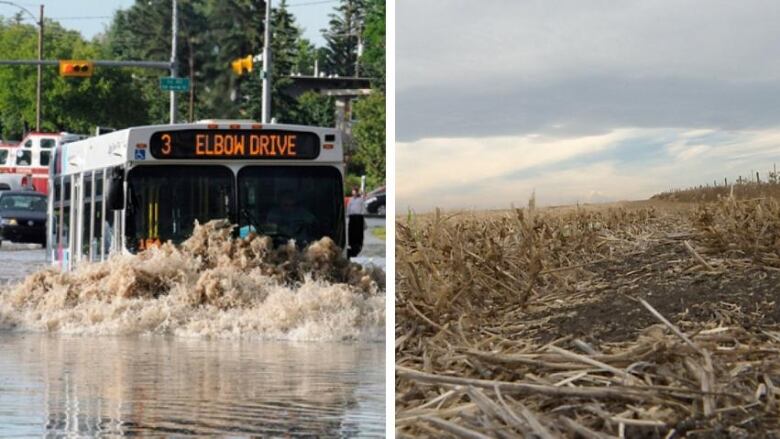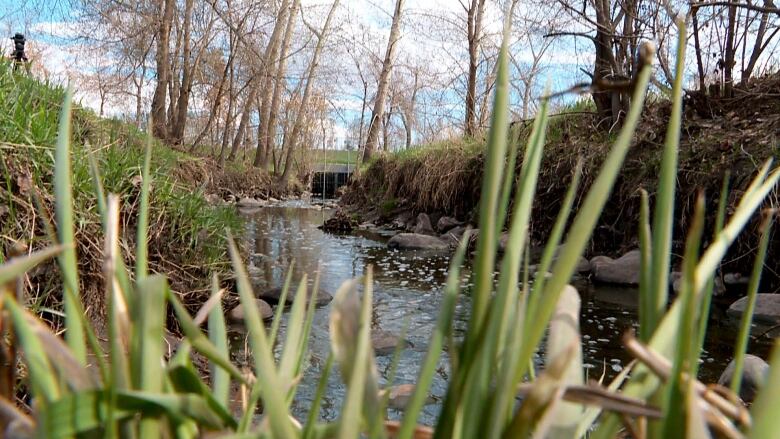From flood to drought, Calgary council talks how to manage city's water supply
Calgary's known for extreme weather but those events are increasing in frequency, says professor

In 2034, Calgary will have 1.7 million residents and it will have maxed out its water allocation from its rivers following two years of drought conditions.
What then?
That was a scenario put to members of city councilMonday in a closed-door session as the group talked about strategies for managing its share of the Bow River watershed.
"It's an important topic, period," said Mayor Naheed Nenshi, pointing out southern Alberta is considered a semi-arid region.
However, experts who spoke to politicians at the meetingunderscored the growing importance of planning for more extreme weather events in the future.
The director of the Prairie Adaptation Research Collaborative and a professor of geography and environmental design at the University of Regina, David Sauchyn, spoke to council about Calgary's climate and weather.
'It's being amplified by a warming climate'
He pointed out Calgary is well-known as a place of extreme weather events.
However, he saiddata shows events like heavy rainfalls and droughts are increasing in frequency and that trend will likely continue to accelerate.
"It's being amplified by a warming climate. It's being exaggerated. So going forward, the wet years are wetter and the dry years are drier."
Sauchyn said in future decadesCalgary's peak rainfall season will become May, not June. There will be more winter rain events as that season will not be as cold as in the past.
He also said trends show river levels will fall further in the July to September timeframe than in the past due to greater water demand.
In recent years, the city has taken steps to reduce water consumption in recognition that it does not haveunlimited access to water.
It has brought in mandatory water meters and invested in upgrades at its water treatment plants.
Year-round water storage?
City officials noted 2019's water supply outlook calls for a drier conditions this year.
An earlier run-off is expected from the eastern slopes of the Rockies and there are above normal temperatures in the forecast.
It puts Calgary into abnormally dry conditions, although parts of Alberta are forecast to see even drier, moderate drought conditions this year.
Nenshi said it does raise the question of whether any future upstream flood mitigation projects like the Springbank off-stream diversion should be converted into year-round water storage projects.
"A reservoir on the Bow River [upstream of Calgary]will be more useful. That said, I know that the new government is in the midst of doing some more analysis on Springbank and if this is somewhere that they want to go, we can certainly help them with the analysis on that," said Nenshi.

Nenshi said it's a useful conversation for policymakers to have, not only about ways of reducing water consumption but ways of getting residents to think more about how they use water.
"Do we want to implement summer water-use restrictions regardless of that particular year's water flow, so that we get used to it? So that we actually when times of drought are there, we're ready?"
There was a little too much focus on climate change for one councillor.
Coun. Sean Chu said it's good to hear from experts on watershed management.
But he questioned the notion that Calgary's weather is actually getting warmer or becoming wetter, a conclusion largely accepted by scientists as one of the impacts of human-caused climate change.
"We have a really cold winter, like huge. The coldest winter in how many years? And you talk about global warming?It's kind of interesting."
- Here's what climate change could look like in Canada
- The psychology of climate change: Why people deny the evidence
Chu remains confident that Calgarians will find ways to cope with the climate or weather in this region.
"The (temperature on) Earth's been going up and down for a long time. And we humans are very resilient. And we're going to learn, adapt and live on."












_(720p).jpg)


 OFFICIAL HD MUSIC VIDEO.jpg)
.jpg)



























































































